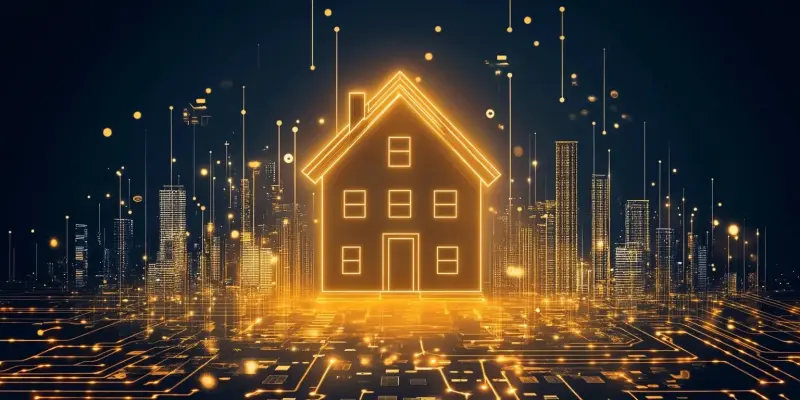The potential of blockchain and AI to transform real estate for global investors is a topic of growing interest and substantial promise. These innovative technologies offer solutions to some of the most challenging pain points in the real estate market, such as lack of transparency, high transaction costs, and lengthy processing times. By leveraging blockchain’s immutable ledger, companies can ensure clear and tamper-proof records of property ownership, significantly reducing documentation costs while providing full transparency in transactions. Blockchain technology’s capacity to store and secure a transparent ledger of all transactions, coupled with AI’s ability to analyze vast amounts of data and predict market trends, sets the foundation for a revolution in real estate investment and management.
HOME3 is one startup that exemplifies how blockchain and AI can democratize real estate by allowing smaller investors to participate using minimal funds through fractional ownership. Rising housing prices are an increasing barrier for younger generations looking to invest in real estate, making it nearly impossible for them to consider property ownership. By utilizing blockchain technology, HOME3 has tackled this issue by ensuring tamper-proof and transparent records of ownership, thereby lowering documentation costs. In addition to making property records immutable, this approach opens up investment opportunities to a wider audience who might have been excluded by traditional real estate investment barriers.
Democratizing Real Estate Investment
The use of blockchain in real estate is not just about transparency but also decentralization and inclusivity. Blockchain’s fundamental structure allows for the elimination of intermediaries, thus making property transactions more efficient and affordable. A platform like HOME3 can facilitate a secure and user-friendly experience for buying, selling, and managing properties. By integrating blockchain with Web3 and AI solutions, the platform focuses on streamlining the entire process, emphasizing ease of use, security, and cost efficiency. This innovative stance aligns with a global trend towards financial inclusivity, allowing even international investors to participate in local real estate markets from anywhere in the world.
One of the significant advantages of HOME3’s approach is the promotion of financial inclusivity on a global scale. Investors can take part in property dealings that were previously out of reach due to geographical or financial constraints. This fractional ownership model allows small-scale investors to own a portion of a property, thus lowering the barrier to entry. These small investments can accumulate, leading to substantial ownership stakes over time. By lowering these barriers, HOME3 is not only democratizing access to real estate but also injecting new capital into the market from a diversified pool of investors.
Integration of AI and Smart Contracts
The integration of AI technology in the real estate sector further enhances the potential for growth and innovation. AI-powered tools can facilitate a stress-free property search for homebuyers and investors by predicting market trends, analyzing property values, and even detecting potential investment risks. These tools enable investors to make informed decisions based on real-time data analysis and predictions, reducing the guesswork that often accompanies real estate transactions. Consequently, AI’s predictive capabilities can help investors optimize their portfolios, ensuring they are making decisions that yield the highest returns. This significantly enhances the efficiency and reliability of property investment.
Another critical innovation in HOME3’s model is the use of smart contracts. These self-executing contracts with terms directly written into code make transactions more secure and efficient. Smart contracts reduce the need for intermediaries such as brokers and lawyers, which can significantly lower transaction costs and processing times. They also offer an added layer of security, as the terms and conditions are immutable once the contract is deployed onto the blockchain. If any party fails to meet the agreed terms, the contract enforces the consequences automatically, minimizing disputes and ensuring fairness.
Global Impact on Real Estate Markets
Blockchain and AI hold significant promise in revolutionizing real estate for global investors, addressing chronic issues like lack of transparency, high transaction costs, and long processing times. Blockchain’s immutable ledger guarantees clear, tamper-proof property records, reducing documentation expenses and ensuring full transaction transparency. This secure storage, combined with AI’s ability to analyze large datasets and predict market trends, lays the groundwork for a transformative shift in real estate investment and management.
One example is HOME3, a startup demonstrating how blockchain and AI can democratize real estate by enabling smaller investors to partake in fractional ownership with minimal funds. Rising housing costs have become a formidable barrier for younger generations aiming to enter the real estate market. HOME3 leverages blockchain to create tamper-proof, transparent ownership records, cutting documentation costs and making property records immutable. This approach broadens investment opportunities for a wider audience, removing the traditional barriers that have excluded many potential investors from the market.

